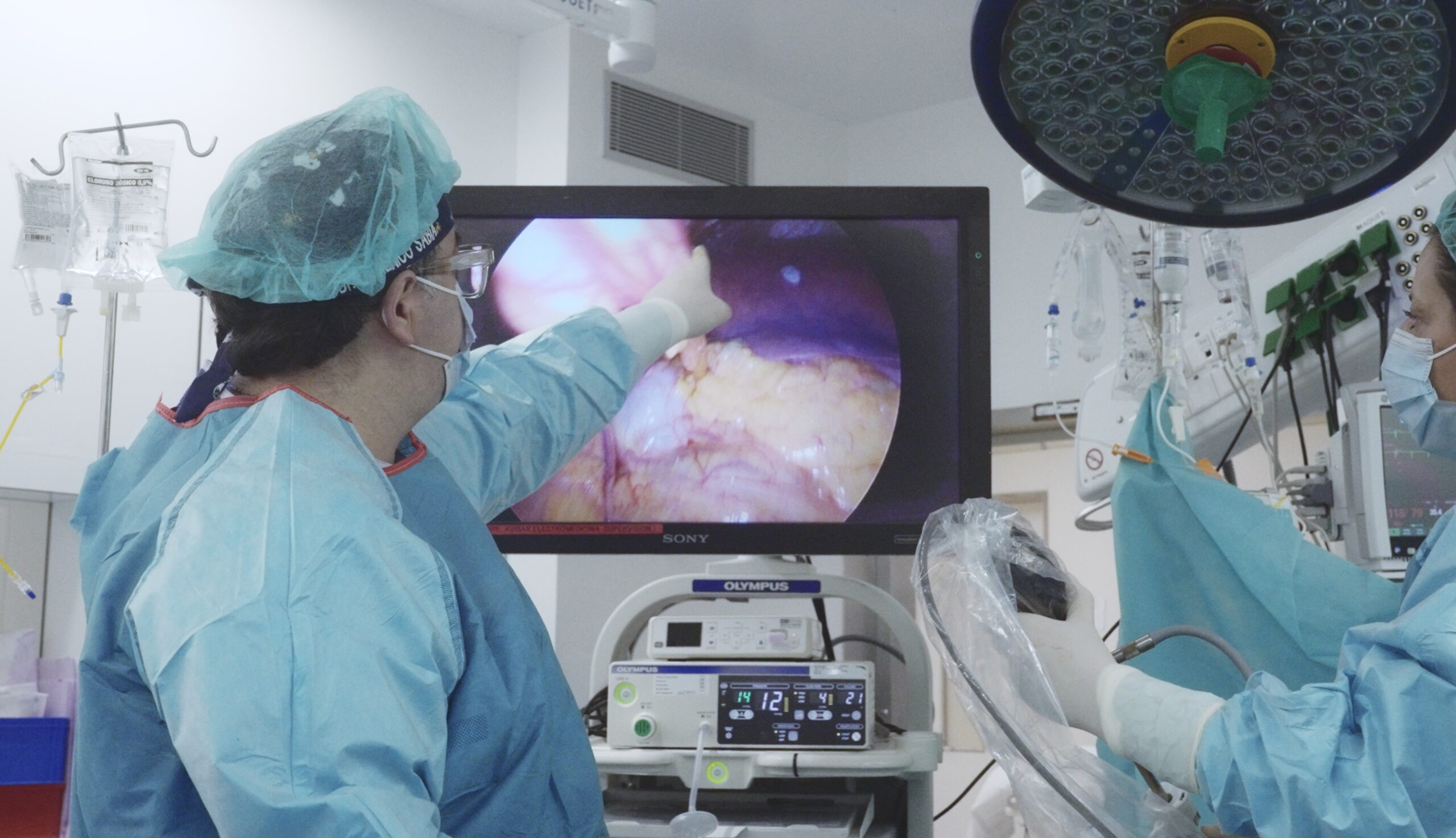PIPAC: indications and contraindications

What is PIPAC
PIPAC (Pressurized Intraperitoneal Aerosol Chemotherapy) is a medical treatment technique designed to deliver chemotherapy directly to the peritoneal cavity (the area that houses the abdominal organs) in a more targeted manner. It involves the use of an aerosol spray to distribute chemotherapy drugs in the peritoneal space under high pressure. This method aims to improve the effectiveness of chemotherapy for patients with peritoneal carcinomatosis, which initially are not candidates for a complete cytoreductive surgery with HIPEC (CRS+HIPEC).
PIPAC is typically performed when a patient has advanced peritoneal carcinomatosis, which refers to the spread of cancer cells within the peritoneal cavity. This can occur with cancers like ovarian, gastric, colorectal, appendiceal cancer or less common in hepatobiliary and pancreatic cancers.
PIPAC is generally considered when other treatment options, like systemic chemotherapy or cytoreductive surgery, are either ineffective or not viable at that moment, due to the extent of the disease.
Types of cancer that can be treated using PIPAC:
PIPAC has been used successfully to treat a variety of abdominal cancers, especially those with peritoneal spread. Common cancers treated with PIPAC include:
-
Ovarian cancer:
Often presented with peritoneal metastasis, and PIPAC can be useful when traditional therapies are not effective.
-
Gastric cancer:
Particularly in cases where the cancer has spread within the peritoneum.
-
Colorectal cancer:
In advanced stages with peritoneal carcinomatosis, when other treatments are not viable.
-
Appendiceal cancer:
Which can also cause peritoneal spread, similar to other gastrointestinal cancers.
-
Peritoneal mesothelioma:
Though rare, this cancer affects the peritoneum directly and may benefit from PIPAC.
-
Pancreatic or biliary tract cancers that have spread to the peritoneum.
-
Other abdominal advanced cancers
PIPAC is primarily used in a palliative setting for symptom control and to slow down disease progression, rather than as a neoadjuvant treatment. It provides an alternative to patients who have few treatment options left.
Indications for PIPAC:
-
Palliative setting:
PIPAC is primarily a palliative treatment, meaning it aims to relieve symptoms, improve quality of life (such avoiding pain, bowel obstruction, ascites), and extend life expectancy rather than cure the disease. It is used when peritoneal metastases cannot be surgically removed, and conventional chemotherapy is less effective or not well tolerated.
-
Neoadjuvant treatment:
In some cases, and our first goal is to use PIPAC in combination to systemic chemotherapy or surgery, to downstaging the peritoneal disease and consider the possibility of a complete cytoreductive surgery (CRS) and hyperthermic intraperitoneal chemotherapy (HIPEC).
Ideal candidates for PIPAC include:
-
Patients with peritoneal carcinomatosis who:
- Cannot undergo or are not candidates for cytoreductive surgery (CRS) and HIPEC due to the extent of the disease or other health issues.
- Have disease that is refractory or resistant to systemic chemotherapy, or where chemotherapy is poorly tolerated.
- Require palliative care to relieve symptoms like pain, ascites, or bowel obstruction.
-
Patients in a relatively good performance status who can tolerate minimally invasive procedures like laparoscopy.
-
Patients with disseminated abdominal cancers where systemic treatments are less effective or cause intolerable side effects.
Contraindications for PIPAC
Pressurized Intraperitoneal Aerosol Chemotherapy (PIPAC) is a specialized treatment, and certain contraindications must be considered to ensure patient safety.
The contraindications for PIPAC can be categorized into absolute and relative contraindications:
Absolute Contraindications:
-
Extensive Abdominal Adhesions:
- Severe adhesions in the abdominal cavity can prevent the even distribution of the aerosolized chemotherapy and hinder the effectiveness of the procedure.
- Severe adhesions in the abdominal cavity can prevent the even distribution of the aerosolized chemotherapy and hinder the effectiveness of the procedure.
-
Uncontrolled Infection:
- Active infections, particularly in the peritoneal cavity or abdominal area, pose a significant risk for complications during and after the procedure.
- Active infections, particularly in the peritoneal cavity or abdominal area, pose a significant risk for complications during and after the procedure.
-
Bowel Obstruction:
- Complete bowel obstruction can complicate the procedure and increase the risk of perforation or other severe complications.
- Complete bowel obstruction can complicate the procedure and increase the risk of perforation or other severe complications.
-
Severe Cardiopulmonary Conditions:
- Patients with significant heart or lung disease may not tolerate the insufflation (introduction of gas) required during the laparoscopic procedure, as it increases intra-abdominal pressure and affects cardiovascular and respiratory function.
- Patients with significant heart or lung disease may not tolerate the insufflation (introduction of gas) required during the laparoscopic procedure, as it increases intra-abdominal pressure and affects cardiovascular and respiratory function.
-
End-Stage Disease or Poor Performance Status:
- Patients with a very poor general condition or those who are in the terminal stages of cancer may not be suitable candidates due to the potential risks outweighing the benefits of the procedure.
Relative Contraindications:
-
Moderate Adhesions:
- While some adhesions may be manageable, moderate adhesions could complicate the delivery of the aerosol. Each case requires careful evaluation.
- While some adhesions may be manageable, moderate adhesions could complicate the delivery of the aerosol. Each case requires careful evaluation.
-
Substantial Tumor Burden:
- A very large tumor load in the peritoneal cavity might limit the effectiveness of PIPAC. In such cases, the treatment might be less beneficial.
- A very large tumor load in the peritoneal cavity might limit the effectiveness of PIPAC. In such cases, the treatment might be less beneficial.
-
Severe Malnutrition or Cachexia:
- Patients with extreme weight loss or poor nutritional status may face higher risks during surgery and slower recovery. Nutritional optimization might be needed before considering PIPAC.
- Patients with extreme weight loss or poor nutritional status may face higher risks during surgery and slower recovery. Nutritional optimization might be needed before considering PIPAC.
-
Previous Abdominal Surgeries:
- Extensive previous surgeries can increase the risk of complications due to scar tissue or altered anatomy. A thorough assessment is required to determine feasibility.
